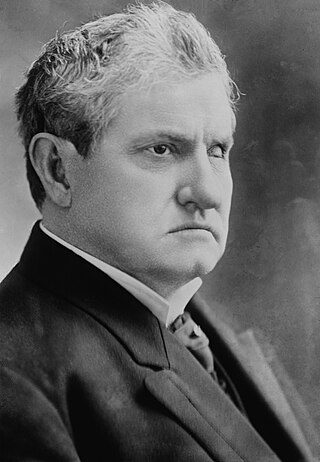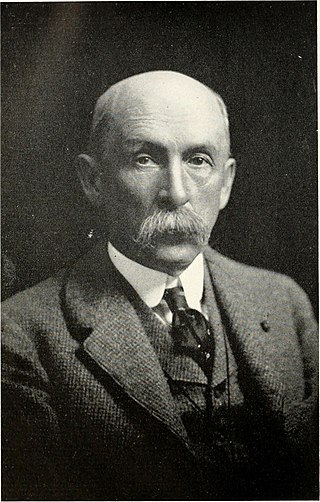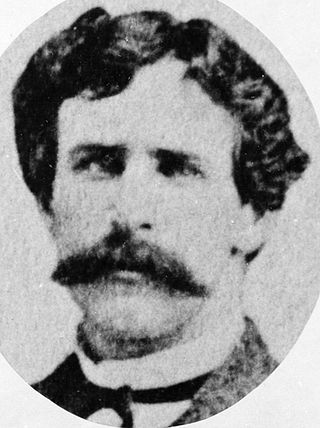Related Research Articles
New Ellenton is a city in Aiken County, South Carolina, United States. The population was 2,210 at the 2020 census. It is part of the Augusta, Georgia metropolitan area.

Benjamin Ryan Tillman was a politician of the Democratic Party who served as governor of South Carolina from 1890 to 1894, and as a United States Senator from 1895 until his death in 1918. A white supremacist who opposed civil rights for black Americans, Tillman led a paramilitary group of Red Shirts during South Carolina's violent 1876 election. On the floor of the U.S. Senate, he defended lynching, and frequently ridiculed black Americans in his speeches, boasting of having helped kill them during that campaign.

Daniel Henry Chamberlain was an American planter, lawyer, author and the 76th Governor of South Carolina from 1874 until 1876 or 1877. The federal government withdrew troops from the state and ended Reconstruction that year. Chamberlain was the last Republican governor of South Carolina until James B. Edwards was elected in 1974.

Richard Coke was an American lawyer and statesman from Waco, Texas. He was the 15th governor of Texas from 1874 to 1876 and was a US Senator from 1877 to 1895. Richard Coke was revered by many Texas Southern Democrats due to his perceived triumphs over Reconstruction era Federal control in Texas politics.

Joseph Hayne Rainey was an American politician. He was the first black person to serve in the United States House of Representatives and the second black person to serve in the United States Congress. His service included time as presiding officer of the House of Representatives.

Franklin Israel Moses Jr. was a South Carolina lawyer and editor who became active as a Republican politician in the state during the Reconstruction Era. He was elected to the legislature in 1868 and as governor in 1872, serving into 1874. Enemies labelled him the 'Robber Governor'.

The Hamburg Massacre was a riot in the United States town of Hamburg, South Carolina, in July 1876, leading up to the last election season of the Reconstruction Era. It was the first of a series of civil disturbances planned and carried out by white Democrats in the majority-black Republican Edgefield District, with the goal of suppressing black Americans' civil rights and voting rights and disrupting Republican meetings, through actual and threatened violence.
More than 1,500 African American officeholders served during the Reconstruction era (1865–1877) and in the years after Reconstruction before white supremacy, disenfranchisement, and the Democratic Party fully reasserted control in Southern states. Historian Canter Brown Jr. noted that in some states, such as Florida, the highest number of African Americans were elected or appointed to offices after the end of Reconstruction in 1877. The following is a partial list of notable African American officeholders from the end of the Civil War until before 1900. Dates listed are the year that a term states or the range of years served if multiple terms.

The 1876 South Carolina gubernatorial election was held on November 7, 1876, to select the governor of the state of South Carolina. The election campaign was a referendum on the Radical Republican-led state government and their Reconstruction policies. Opponents disputed the challenger Wade Hampton III's victory, gained by a margin of little more than 1100 votes statewide. But he took office in April 1877, after President Hayes withdrew federal troops as a result of a national Democratic compromise, and the incumbent Daniel Henry Chamberlain left the state.
The South Carolina civil disturbances of 1876 were a series of race riots and civil unrest related to the Democratic Party's political campaign to take back control from Republicans of the state legislature and governor's office through their paramilitary Red Shirts division. Part of their plan was to disrupt Republican political activity and suppress black voting, particularly in counties where populations of whites and blacks were close to equal. Former Confederate general Martin W. Gary's "Plan of the Campaign of 1876" gives the details of planned actions to accomplish this.

The 1880 South Carolina gubernatorial election was held on November 2, 1880 to s elect the governor of South Carolina. Johnson Hagood was nominated by the Democrats and ran against L. W. R. Blair, a Greenback-Labor candidate. Hagood easily won the general election and became the 80th governor of South Carolina.

Richard Howell Gleaves was a lawyer, merchant, and politician who served as the 55th Lieutenant Governor of South Carolina from December 7, 1872 to December 14, 1876. He served under Governors Franklin J. Moses, Jr. and Daniel Henry Chamberlain. A Haitian-American of mixed ancestry, Gleaves was notable as one of the highest elected black Americans during the Reconstruction Era.
The following table indicates the parties of elected officials in the U.S. state of South Carolina:

James Aldrich was a South Carolina circuit judge and state representative.

Prince R. Rivers was a former enslaved man from South Carolina who served as a soldier in the Union Army and as a state politician during the Reconstruction era. He escaped and joined Union lines, becoming a sergeant in the 1st South Carolina Volunteers, a Union regiment in the American Civil War.

The Ellenton riot or Ellenton massacre occurred in September 1876 and took place in South Carolina in the United States. The massacre was preceded by a series of civil disturbances earlier that year following tensions between the Democratic Party and the Republicans. Author Mark M. Smith concluded that there was one white and up to 100 blacks killed, with several white people wounded. While John S. Reynolds and Alfred B. Williams cite much lower numbers.
Joseph Crews was a Reconstruction militia leader who served as a member of the South Carolina House of Representatives from 1874 until his assassination in 1875. He was the state's highest-ranking military official in the 1870s and was put in charge of the state militia whose main purpose was to protect African-American voters. African-Americans were 58.9% of the population of South Carolina in 1870. He was reportedly murdered by Democrats in the run-up to the 1876 South Carolina gubernatorial election.
Alfred Rush was a state representative in South Carolina during the Reconstruction era, serving two non-consecutive terms between 1868 and 1876. Rush was one of four men who represented Darlington County, South Carolina, three of whom were African Americans and one was white. Rush was elected to serve just a few years after the Civil War (1861–1865). He was ambushed and murdered on May 13, 1876.
The Meriwether Monument is a pillar erected in 1916 at John C. Calhoun Park in North Augusta, South Carolina, to commemorate Thomas McKie Meriwether, the only white man killed in the Hamburg massacre when white supremacist militias attacked African Americans in coordinated political violence, seeking to restore the Democratic Party to power and disenfranchise African American voters. The massacre occurred in 1876 and was part of a violent political campaign at the end of the Reconstruction era. The monument was erected 40 years later during the Jim Crow era. Protests at the monument were organized in 2020 after the murder of George Floyd as part of Black Lives Matter activism.

Octavius Coke was an American lawyer and politician. A Democrat, he served in the North Carolina Senate and as North Carolina Secretary of State from 1891 to 1895. Born in Virginia, he read law and opened a legal practice in Williamsburg before enlisting in the Confederate States Army. He quickly attained the rank of captain and was wounded several times throughout the war. After the conflict ended he established a law practice in Edenton, North Carolina.
References
- 1 2 Freedom's Lawmakers by Eric Foner Louisiana State University Press 1996 page 47
- ↑ "South Carolina During the Late 1800s - The 51st General Assembly (1874-1876)". www.carolana.com.
- 1 2 "Ellenton Riot". South Carolina Encyclopedia.
- ↑ Poole, W. Scott (2002). "Religion, Gender, and the Lost Cause in South Carolina's 1876 Governor's Race: "Hampton or Hell!"". The Journal of Southern History. 68 (3): 573–598. doi:10.2307/3070159. JSTOR 3070159 . Retrieved 19 April 2022.